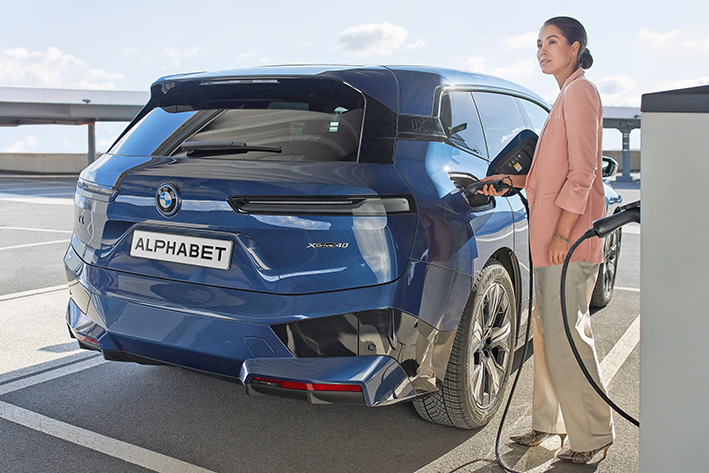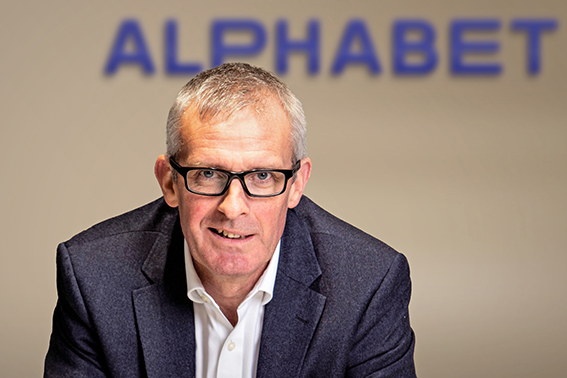The lines between corporate funding and retail finance are blurring.
Clear evidence is provided by the FN50, which last year revealed that private cars accounted for 17% of the total funded fleet, a noticeable rise from 13% in 2016.
Alphabet (GB) has taken note.
It became the latest major leasing company to react to this trend after former chief executive Nick Brownrigg moved to a group role in the Netherlands.
Parent BMW Group took the decision to appoint CEO of BMW Financial Services (GB) Mike Dennett as chief executive officer of both businesses.
Dennett is now responsible for consumer and business funding, following an example set four years ago by Lloyds Bank when Richard Jones, Black Horse managing director, assumed the same position at Lex Autolease.
“Historically, there was a clear divide; that is no longer the case,” Dennett tells Fleet News in his first interview since the expansion of his role.
The lines between corporate funding and retail finance are blurring.
Clear evidence is provided by the FN50, which last year revealed that private cars accounted for 17% of the total funded fleet, a noticeable rise from 13% in 2016.
Alphabet (GB) has taken note.
It became the latest major leasing company to react to this trend after former chief executive Nick Brownrigg moved to a group role in the Netherlands.
Parent BMW Group took the decision to appoint CEO of BMW Financial Services (GB) Mike Dennett as chief executive officer of both businesses.
Dennett is now responsible for consumer and business funding, following an example set four years ago by Lloyds Bank when Richard Jones, Black Horse managing director, assumed the same position at Lex Autolease.
“Historically, there was a clear divide; that is no longer the case,” Dennett tells Fleet News in his first interview since the expansion of his role.
“The needs of private and corporate/SME (small-to-medium enterprise) customers are changing.
"As we move towards electric vehicles, we see more private buyers demanding one monthly price. Bringing both parts of the business closer together will leverage our knowledge and help us to focus on customers more.”
Alarm bells have been rung by some fleets who point out that, unlike Lloyds Bank, Alphabet is owned by a manufacturer. Will this move repeal its multi-marque offering?
No, insists Dennett. “We will leverage the common capabilities, such as the back office and reducing the duplications on future developments, whereas the front end will remain specific and discrete for each brand,” he says. “We have to be a credible long-term partner for our customers.”
Offering all makes
BMW Financial Services will remain the own-brand specialist, primarily targeting private buyers via the franchised dealer network, while Alphabet, which celebrates its 25th anniversary this year in the UK, will continue to offer all makes to both corporate and private buyers. This includes via salary sacrifice, which it is in the throes of launching (see below).
Both companies bring strengths and learnings from different ways of operating, notably in PCH, end-of-contract treatment, credit assessments, decision-making processes and customer retention.
While Alphabet’s strengths lie in the service provision for fleet decision-makers, with solutions to “make their lives easier”, says Dennett, the needs of the user-chooser are more closely aligned to the retail customer where BMW Financial Services holds the aces.
 Spencer Halil (left), Alphabet chief commercial officer, explains: “We recognise that our key relationship is with the fleet decision-maker, but it’s also critical that we have a strong relationship with the driver and corporate can learn a lot from retail in that area.
Spencer Halil (left), Alphabet chief commercial officer, explains: “We recognise that our key relationship is with the fleet decision-maker, but it’s also critical that we have a strong relationship with the driver and corporate can learn a lot from retail in that area.
“The customer strategy is called Pace – Premium Alphabet Customer Experience – and it flows through the whole business.”
Alphabet has ambitious growth plans, believing there are plenty of opportunities to win business in the UK, despite its maturity. This will be achieved, says Dennett, by “making mobility easy” through flexibility, digitisation and deploying a multi-modal service proposition.
The company was one of the first to dip a toe into mobility services with the launch of AlphaCity car sharing in 2012 and AlphaElectric in 2014. But mobility is an amorphous subject that struggles to be clearly defined.
“It means different things to everyone – from ownership to usage,” says Dennett.
“But we’re focusing on the customers’ needs and demands and providing services that meet them.
“Use of the vehicle will remain, such as car share and subscriptions, and we are seeing demand increasing for those services. But we still have drivers that want exclusive access to a car.”
The priority is to offer an end-to-end service that will appeal to larger corporates and SMEs alike.
“We are strong in the medium-to-large fleets while most of our SME business is via brokers,” says Halil.
“But our strategy is to have a full service fleet offering in SME to complement the brokers.
“They tend to be price point, single transactions; we are targeting the 50-plus car fleets with a similar service to the bigger fleets.”
The product is under development while an SME team is being recruited; most roles are likely to be filled internally. The software platform will be based on existing systems.
Dennett adds: “We will refine our acquisition and on-boarding process and then it’s providing the internal focus for customer service and maintaining the ongoing relationship.”
Focus on vans
Van is a major focus; Alphabet is under-represented in the sector with light commercial vehicles (LCVs) accounting for just 20% of its 130,000 funded fleet, eight percentage points lower than the FN50 average and nine below its peers within the top 10.
“The fastest growing segment is LCVs,” says Halil.
“We’re also seeing interesting developments with LCV fleets because of the limitations on electric. We could end up with last-mile through e-cargo bikes.”
Full electric (BEV) and plug-in hybrid (PHEV) make up 28% of Alphabet’s car fleet, one of the highest proportions in the FN50, although in the first three months of this year, this has accelerated to 48% of new orders, with BEV the main catalyst. Vans, unsurprisingly, are a little way behind; 10% of new business fleet registrations are BEV.
“We are seeing record demand. But, of course, supply is an issue,” Dennett says. “However, we think manufacturers will prioritise BEV and PHEV.”
He adds: “It’s a new experience to be short of supply. We are managing it through proactive communications with customers and drivers and by leveraging our relationships with manufacturers.”
Alphabet is closely monitoring supply times at a brand and model level and starting talks with customers nine-12 months out based on a seven-month lead time.
Some drivers have also switched into alternative models if faced with excessive lead times. Dennett says:
“Fleet policies have been restrictive in the past; now they are opening up to more brands."
The company has endeavoured to be flexible on contract extensions, while exploiting its rental offering for those whose cars are being de-fleeted.
“We have seen an increase in rental by 200% versus pre-pandemic levels from existing customers especially with the shortage of cars as they come to the end of their contract,” says Dennett.

He believes rental will be “a foundation” of mobility and reveals the business will be launching a BMW Rent product shortly as a pre-cursor to a more generally available service, currently in pilot, which is scheduled for quarter three.
Keeping to original quote
Extended supply times and global economic pressures are combining to result in P11D price rises in the period between order and delivery. Alphabet tries, as much as possible, to keep to the quote agreed, but Halil admits there “is a lot of changing – the financial market is volatile”.
He says: “As far as the price we can control, we will stand behind it. We can guarantee the price on the interest rate, even in a volatile market, but if manufacturers increase prices or change specifications, then we will have to pass that on.
“The customer has the option to review the order, and this can result in cancellations, but we’re not seeing too much of this because they would then lose their place in the queue.”
Supply constraints have tempered the immediate growth prospects, with Alphabet anticipating a “business contraction” this year as contract renewals roll into 2023.
“We focus on five-to-six-year growth, and we see the market coming back fully in 2024,” Dennett says. “We are carrying record orders and continue to take more than we can deliver – we are holding three times the level we would normally carry.”
He bullishly predicts a revival in the company car, stimulated by low benefit-in-kind (BIK) tax rates for ultra-low emission cars.
“If you had asked me in 2018, it would’ve been all about PCH, but that was probably a fallout on availability and supply. I don’t see that continuing on the same trajectory as pre-pandemic,” he says.
“Instead, we are seeing corporates reviewing the rewards packages they offer to employees and this will result in a rejuvenation of the company car.”
Enhanced digital offering
In preparation, Alphabet is focusing on enhancing its digital offering to fleets and drivers. The AlphaGuide self-service portal will be revamped later this year with additional facilities, while fleets will be able to access additional reporting and advice through the AlphaConnect dashboard, particularly on sustainability.
“We are digitising our reporting, for example CO2 and emissions footprint, and share of BEV with cars and vans,” says Dennett. “It’s about providing them with the information they need in their sustainability journey.”
A new 360-degree app is also under development which will act as a central hub, bringing together information on all Alphabet’s services with one sign-on. The digital journey has been given fresh impetus from an acceleration in vehicle connectivity, although questions remain over ownership and management of data.
Nevertheless, it is an “untapped opportunity”, according to Halil. He adds:
“Where manufacturers are willing to share technical data, leasecos can feed it into their dashboards to provide fleets with information about where their vehicles are, how far they have driven, PHEV electric driving times versus fuel.”
Not all manufacturers are open with their data, though, and Halil has a message for them: “Manufacturers that don’t release data and can’t be part of the dashboards might not be chosen by fleet decision-makers.
“So, that might drive the release of data.”
New sal/sac scheme to exploit ‘resurgence’ in benefit cars
The car as a benefit is experiencing a “resurgence” in the company car fleet, according to Mike Dennett, as employers look at new ways to offer mobility options to their wider employee bases.
Alphabet has long offered a white label sal/sac product via a third party provider, but is readying its own scheme to take advantage of the huge staff populations across its customers.
“We are piloting salary sacrifice which is in its final phases and will go live this quarter,” says Dennett. “We have a long list of customers that want it.”
The white label partnership will continue, primarily for smaller customers, but Alphabet is reacting to the growing prominence of sal/sac in new business tenders due to the favourable tax position of electric cars.
“If we didn’t have our own scheme, we would be excluded from some tenders,” Spencer Halil says.
“So, we have to be involved directly to offer a full suite of fleet management services. Our own proposition will be for our bigger corporate customers.”
Login to continue reading.
This article is premium content. To view, please register for free or sign in to read it.























Login to comment
Comments
No comments have been made yet.